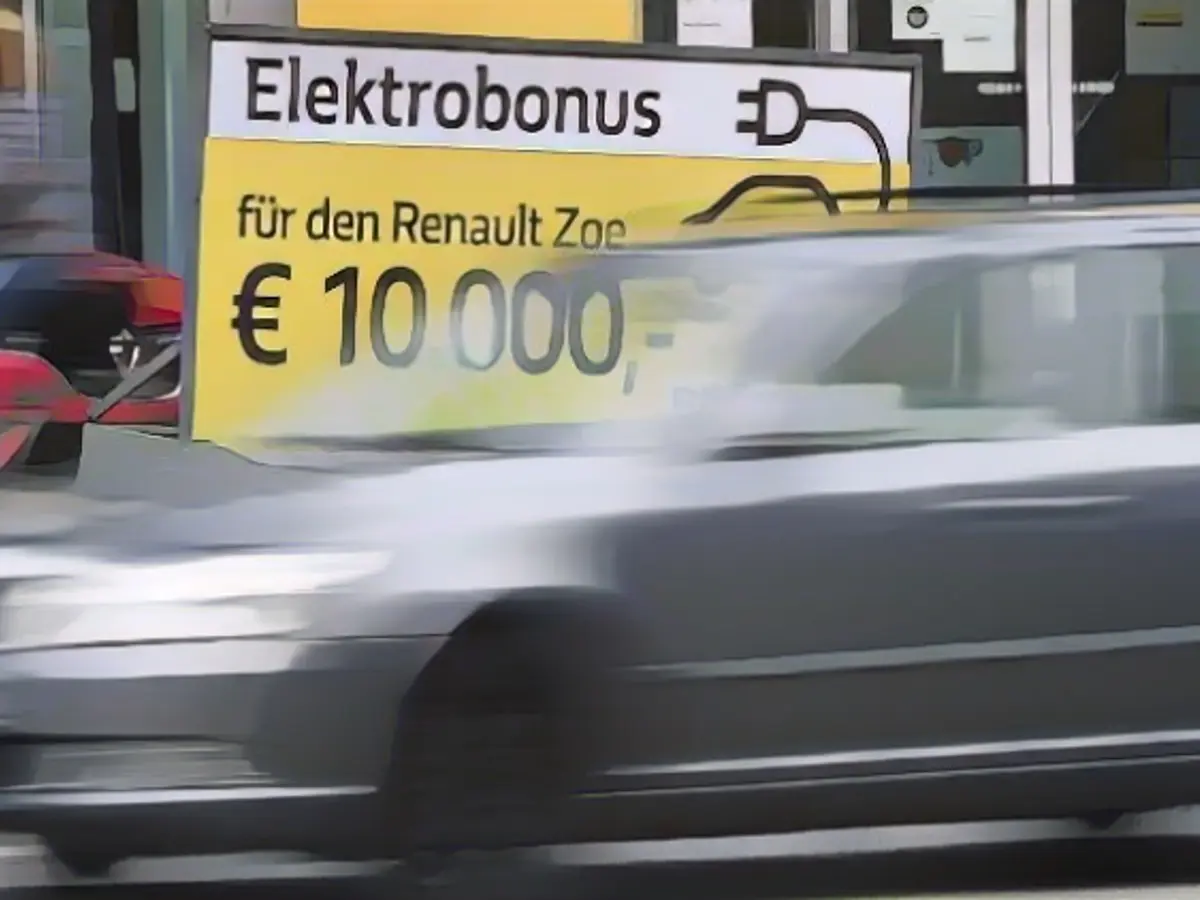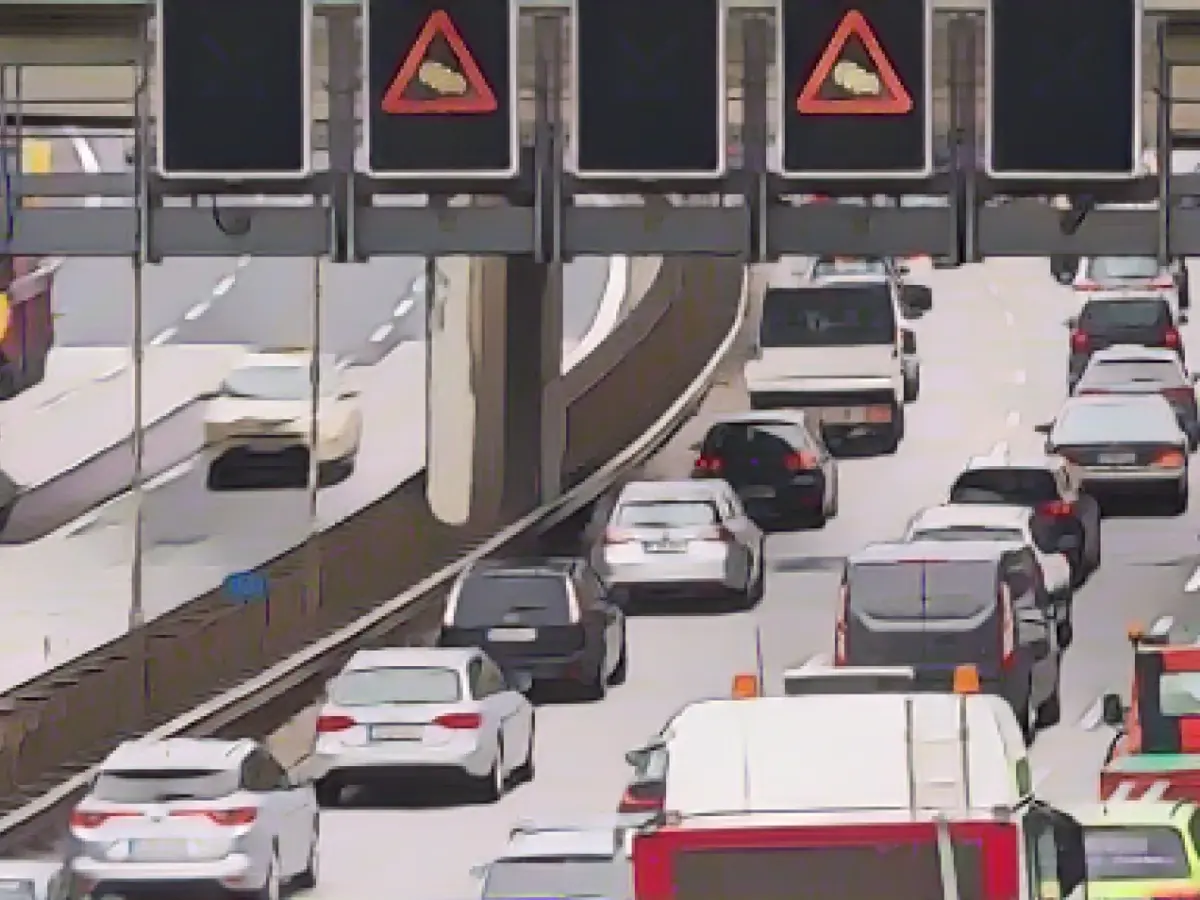Testers of the abrupt end to the e-car premium's validity are set to step into the limelight
While the final say on the immediate cessation of the e-car purchase incentive hasn't been announced yet, SPD parliamentary group Vice Chair Dirk Wiese makes it clear: the coalition's agreement isn't yet a deal in the federal budget – that is up to the Bundestag to decide.
In the wake of this, Wiese suggests revisiting the agreement, focusing on the abrupt halt to the e-car premium and the agricultural diesel tax break. "Here", he says, "we'll take another look, as this undoubtedly undermines the confidence of many," Wiese shared on Deutschlandfunk radio.
Regarding the e-car premium, Wiese proposes reconsidering phasing it out while allowing those who already applied and counted on it in their vehicle choice to do so. However, it's undeniable that, should they decide to retract environmental incentives or agricultural diesel exemptions, budget cuts will be mandatory elsewhere.
It's evident: the political agreement reached by Federal Chancellor Olaf Scholz, Vice Chancellor Robert Habeck, and Finance Minister Christian Lindner has not sealed the deal on the 2024 federal budget. As stated by Wiese, "the budget is made by the German Bundestag," and the coalition will scrutinize each proposition leading up to its final acceptance in the beginning of January.
Consumer advocates endorse the prompt conclusion, primarily
Following the government's prompt conclusion of the premature ending of the e-car state purchase premium and discontinued environmental bonus, consumer associations only endorse the decision in principle. The Ministry of Economics and Climate Protection announced the closure of new applications for the environmental bonus at the weekend and confirmed that already approved grants would be paid.
Last Wednesday, the tri-coalition of the SPD, Greens, and FDP agreed on how to address budget shortfalls following the Federal Constitutional Court's budget ruling. This encompasses both the core budget and the Climate and Transformation Fund (KTF), which supports e-car incentives. According to the Ministry, the e-car subsidy was set to expire at the end of 2024, provided funds weren't exhausted sooner.
The German Federation for the Environment and Nature Conservation now attests to the automotive industry's responsibility. BUND transport expert Jens Hilgenberg asserts that German manufacturers have thus far refused to offer "affordable e-cars for the masses." ADAC also shared concerns, noting a scarcity of e-vehicles priced under 30,000 euros in the market. Hilgenberg acknowledges that BUND generally welcomes the discontinuation of flat-rate purchase incentives financed by taxpayers' money, with approximately 10 billion euros spent in recent years.
Consumer associations have welcomed the accelerated demise of the purchase premiums in principle. According to the federal association's mobility expert, Marion Jungbluth, such incentives were key to spurring e-car growth in the short term. However, in the long run, market recovery cannot merely rely on taxpayer-financed subsidies.
Parliamentary group calls for "realistic transition periods"
ADAC criticized the procedure of only engaging the funding commitment at the time of registration, as opposed to purchase. For customers unable to register their e-vehicle by December 17, the decision wasn't easy to swallow, as they had factored in the environmental bonus.
The SPD parliamentary group supports the premature expiration of the subsidy but finds the sudden stop on December 17 announced over the weekend unfortunate. Climate Minister Robert Habeck must guarantee more consistent transition periods, affirm SPD parliamentary group leaders Detlef Müller, Matthias Miersch, and Verena Hubertz. They explained, "Citizens expect realistic transition periods from decision-makers when buying a new car. Most likely, consumers meticulously calculate their budget, factoring in the premium."
The German Association of Sales and Service (ZDK) also expressed concerns over the abrupt end of the subsidy, referring to the loss of trust by tens of thousands of customers who had ordered their e-vehicles under the assumption that the subsidy amount would remain.
Lindner: No promise of perpetual funding in the first place
Finance Minister Lindner discussed the ARD program "Bericht aus Berlin" on Sunday evening, stating it had always been clear that the environmental bonus would eventually come to an end. There had never been a fixed end date for the subsidy, maintaining that the expiry was evident.
To boost sales, the previous government introduced a purchase incentive in 2016. Since then, around 10 billion euros have been allocated for approximately 2.1 million electric vehicles. BAFA has received around 376,000 applications for electric vehicles this year, with 2.4 billion euros paid out. However, applications have decreased compared to 2022 since only battery and fuel cell-powered vehicles are now eligible and because individuals are no longer authorized to apply for the environmental bonus since September. In 2022, 820,000 vehicles were approved for 3.4 billion euros in funding.
Money in the pot may have been running low
The Ministry of Economic Affairs dismissed criticism of the hasty conclusion on Sunday. It explained that "unfortunately, an unfortunate situation for those who had hoped for funding" ruled, but the administration had no choice but to make the decision due to budget constraints. According to ministry sources, the 2023 funds have been exhausted. The allocated 209 million euros for 2024 might also be insufficient if applications continued beyond this cutoff.
Given that around 1,400 applications are processed every day, with an average grant of 4,000 euros, each additional day could cost taxpayers around 5.6 million euros. If applications had been halted at year-end, approximately 80 million euros would have been enough if applications did not surpass this guiding figure.
Dudenhöffer speaks of an electric car crisis in Germany
According to Ferdinand Dudenhöffer, the German automotive industry may be entering an electric car crisis due to the federal budget crisis, intending to slash sales by up to 200,000 electric cars in Germany in 2024 without subsidies. He asserts that electric vehicles would otherwise be unaffordable for the average consumer, underlining the role of incentives in promoting eco-friendly alternatives.
Read also:
Enrichment Data:
The current standing and potential outcomes of revising the abrupt end to the e-car purchase incentive, as suggested by SPD parliamentary group Vice Chair Dirk Wiese, remain unclear from the available resources. However, we can infer some context and implications from the information provided:
- Expanding Electric Vehicle Adoption: The sluggish uptake of electric mobility in Germany is projected to improve in 2025 due to shifting attitudes and the availability of more affordable electric vehicles (EVs) [1]. This suggests an ongoing interest in promoting EVs, which could bolster arguments for reconsidering subsidies.
- EU Incentives: The European Union is looking into proposals for EU-wide purchase incentives for electric vehicles, harmonizing with Germany's efforts to support EV adoption [3]. This indicates a broader European context where incentives for EVs are being considered.
- Environmental and Economic Goals: The Energiewende (Energy Transition) in Germany aims to reduce fossil fuel dependence and increase renewable energy sources. Promoting EVs is part of this broader strategy to lessen emissions and drive the shift to cleaner energy [2].
- Public Reception and Usage: A survey by HUK Coburg revealed that people become more receptive to purchasing an EV following their first-hand usage. This indicates that practical experiences with EVs significantly influence consumer behavior, potentially supporting the continuation or revival of subsidies [1].
- Chancellor's Stance: Chancellor Olaf Scholz expressed opposition to EU fines for automakers funding electric mobility, indicating a commitment to supporting the transition to EVs [1].
Rearranging the e-car purchase incentive might have diverse outcomes: - Boosting Adoption: Reinstating or preserving subsidies could accelerate the adoption of EVs, aligning with the broader goal of reducing emissions and disseminating clean energy. - Economic Impact: Subsidies could prop up the expansion of the EV market, potentially encouraging job creation and economic development within the automotive and allied industries. - Public Acceptance: Continuing or reintroducing subsidies could enhance public acceptance and usage of EVs, as demonstrated by the HUK Coburg survey.
However, the specifics and feasibility of such a move depend on various factors, such as the current budget situation, the effectiveness of previous subsidies, and ongoing economic and environmental strategies in place.








